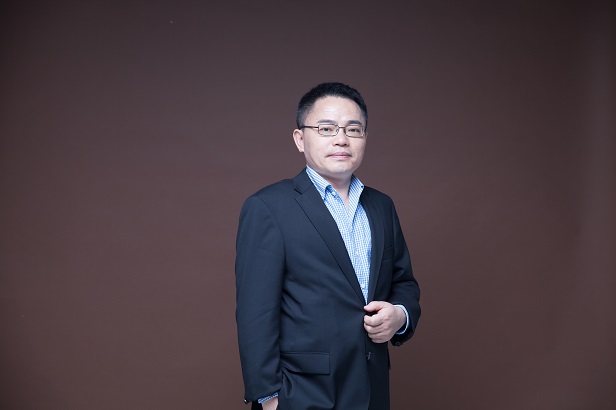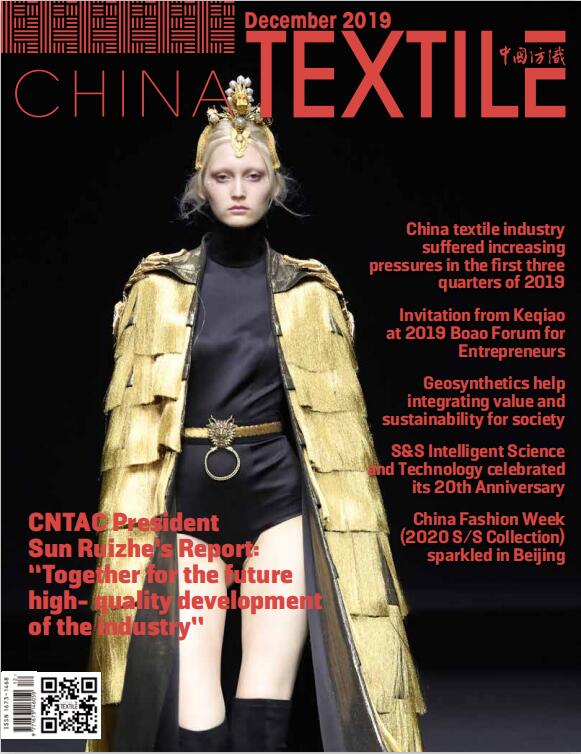An “invisible champion” behind brands
Interview with Gao Baolin, President of ASIA SOCKS INC.
Feb 15, 2017 | by Zhao Zihan
-
More than 180 foreign trade salesmen;
-
15 auto-control factories;
-
Over 4,300 direct employees;
-
Ranked 1st in hosiery export in China;
-
Producing 1.2 billion pairs of socks annually with more than 200 million USD in export;
-
Enjoying 36 global well-known brands including Nike, Puma, and Uniqlo as its clients;
-
More than 60% of products are made from functional raw materials based on its own technology and own brand or produced by its own intelligent robots;
-
Products are mainly exported to the United States, Japan and Europe.
It is ASIA SOCKS INC.
China Textile found an opportunity to have an interview with Gao Baolin, President of ASIA SOCKS INC.

Mr. Gao Baolin once served as a manager in China National Light Industrial Products Import and Export Corporation in 1990s when he learned that North Carolina in the United States enjoyed the world’s largest sock production, while “the sock market competition in China was not sufficient at that time, and it was an opportunity for China.” Since then, Gao Baolin had started his foreign trade business and got involved in socks. Later, he founded a knitting factory in Yangzhou, followed by ASIA SOCKS INC. established in Shanghai in 2000.
At present, ASIA SOCKS has seen more than 180 foreign trade salesmen, 15 auto-control factories, and over 4,300 employees. According to the Customs export statistics publicly released by China Chamber of Commerce for Import and Export of Textile and Apparel, ASIA SOCKS has been ranked first in hosiery export in China since 2009, a standout in the leading enterprises of the industry. It is introduced that more than 60% of products are made from functional raw materials based on its own technology and own brand or produced by its own intelligent robots. Products are mainly exported to the United States, Japan and Europe.
The company has kept the leading position in the industry for many years in socks exports business with an annual production of 1.2 billion pairs of socks and more than 200 million USD in outbound shipment, attracting 36 global well-known brands including Nike, Puma, and Uniqlo as its clients.
In recent years, some enterprises have fled from the manufacturing sector as affected by the downward economy, which is not in the case of Mr. Gao Baolin who has stayed firm in the hosiery industry for over two decades without intention for other business lines.
An “invisible champion” behind brands
“Invisible champions” have the common features that we understand in getting involved in a seemingly insignificant necessity, making it increasingly finer and stronger, and winning the first place in the industry.
It seems to be an irreversible trend that the domestic manufacturing enterprises are gradually moving to the Southeast Asia owing to the continuously increasing labor, land and other costs. In this context, ASIA SOCKS still focuses on ODM business in China, without rushing to build factories in the Southeast Asia or create its own brand.
From the perspective of brand, Gao Baolin just plays a supporting role, but he really enjoys it. “I have always been regarding it as a sideline in my life as well as one of my most important interests. What is my main business? Reading, and to be a man who reads books for the rest of my life.”
What is the core competitiveness of OEM enterprises? Gao Baolin said that the most important thing was to make the company become a brand through reducing costs based on technology, as well as strong financial strength, experience and reputation, to focus on OEM, and to make the best of it.
Establishing independent brands is the ultimate goal the OEM enterprises striving for the transformation and upgrading. However, ASIA SOCKS has never built its own brand. “It must be very costly to take 20 years to create a brand, and 60 years for keeping it on the tide. Different companies grow along various tracks. To my mind, it is very good to be a manufacturer as an invisible champion, shifting OEM mode to ODM in the upstream industrial chain, making it possible to provide clients with design programs and then manufacture products for their brands to explore more overseas markets.
In his view, China has the “big and complete” industrial chain, an unrivaled structure that any other country in the world cannot match. Believing China’s industrial transformation and upgrading is bound to be a success, Mr. Gao holds to his view, saying “For the company, the opportunity has not yet come for me to own a brand, and the ODM businesses will still be popular in the next 30 years.” He also believes that whoever are the early birds for ODM business will have the floor to speak for core technology and market.
Intelligent manufacturing to resolve labor-intensive issues
In face of the labor shortage and rising labor costs, it is vital to break through the bottleneck in order to achieve business transformation, especially for the companies centered on outsourcing production.
In a casual conversation with his Turkish counterparts in 2011, Gao Baolin learned that an Italian company had developed a smart robot that could knit socks which was then finally introduced to ASIA SOCKS after some twists and turns. It is introduced that this smart hosiery-knitting robot can have such three processes as welt knitting, sock knitting, and sewing completed continuously in one hosiery machine. In addition, the whole process is under computer intelligent control, achieving intelligent production from design to the finished product based on the requirements of different clients. Each group of 68 robots only need a skilled technical staff, saving about 2,000 workers compared to the conventional knitting process, significantly reducing labor costs and improving product quality and production efficiency.
However, it is in 2013 that ASIA SOCKS won an initial success from smart manufacturing. In response to the national strategy of transformation and upgrading, all equipment in the factories and R&D center were transformed into intelligent robot production lines through imports, and currently 700 intelligent hosiery-knitting robots have been running successfully on line. “Smart manufacturing can only be successful in China, because China has established the largest manufacturing system and a complete industrial chain.” Gao Baolin said.
Intelligent manufacturing can double the production efficiency, and companies hope to tackle the high labor costs by virtue of smart technologies. In the last Spring, China’s first Smart Knitting Industrial Park saw a ground breaking in Shuyang, Jiangsu Province, the production base of wrapped yarn. Gao Baolin, who has invested 800 million yuan in the establishment of Jiangsu Southwest Intelligent Textile Co., Ltd. and stationed in the industrial park, placed great expectations on it. “Putting investment into smart manufacturing is mainly to reduce costs and improve efficiency. The less the labors are employed, the more the profits are made, which is a fact that the textile industry cannot avoid.” He hopes to further enhance the enterprise’s intelligent advantages depending on the local complete hosiery industrial chain and the intelligent industrial park.
ASIA SOCKS also increased R&D investment and introduced international advanced equipment for design and development of intelligent socks, enjoying a favorable position in domestic and overseas markets relying on its smart socks and middle- and high-end socks with a leading competitive advantage. The successful transformation has helped the company achieve rising exports against the global headwind. From 2013 to 2015, the company witnessed respective export value of 146.77 million USD, 195.35 million USD, and 262.98 million USD, presenting an marvelous growth. The year of 2015 saw exports of various sock products of more than 1.2 billion pairs, which were mainly exported to the United States, Japan and Europe.
“We have accumulated more than 30 brands, experiencing a process from our initiative to look for clients to the clients’ initiative to come to us. Furthermore, just as a saying goes ‘when it is dark in the east, it is light in the west’, I am in better position to have vantage point in business deal because there are so many brands to come to me, causing a passive bargaining for them. Moreover, we have new equipment to create new products, which also brings us the pricing power.” Gao Baolin introduced.
According to Gao Baolin, the following intelligent machine upgrade plan is to continue to introduce advanced foreign equipment, aiming to own 1,200 automatic hosiery machines by the end of 2017, and it is expected to become the largest intelligent 4.0 manufacturing plant within the industry through the use of its own rooftop solar power. In addition, cooperation agreements will be signed with the relevant colleges and universities to promote the company’s intelligent manufacturing through cooperation by production, study and research as well as the industrialization of scientific and technological achievements.
He also revealed that from the second half of last year, ASIA SOCKS had started software and hardware development for automatic hosiery machine to speed up the integration of intelligent equipment, operation, and management as well as the integration of all sections including design, production and sales supply chain, in order to achieve low energy consumption and high-efficiency production. Based on the introduction of foreign advanced equipment, Mr. Gao resorts to scientific research cooperation with universities, keeping a goal in mind to break the technical barriers from foreign countries, ultimately to achieve automatic mass production and package by “one-step automatic hosiery machine”, a fully-fashioned knitting technology to create a new starting point for China’s intelligent manufacturing.



